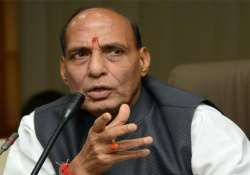Lot needs to be done to remove untouchability: Rajnath
New Delhi: Home Minister Rajnath Singh on Monday said untouchability has been abolished to a large extent "but there is a lot to be done to remove it completely" from the country as not all

New Delhi: Home Minister Rajnath Singh on Monday said untouchability has been abolished to a large extent "but there is a lot to be done to remove it completely" from the country as not all understand that all humans are equal.
Participating in a function here, held on the eve of Bhimrao Ambedkar's birth anniversary, to symbolically liberate from untouchability thousands of women manual scavengers from Rajasthan and Ghaziabad in Uttar Pradesh, Singh ate food with them.
"It's a historic occasion and I am touched," he said later.
"Not all are able to understand it (the fact that all humans are equal) and accept it," Rajnath Singh said, addressing the function.
"India is one country which, from ancient times, believed that the entire mankind is one family," he said, calling upon people to do away with the social evil of untouchability.
The minister also lauded the "Swachh Bharat Abhiyan" (cleanliness campaign) of Prime Minister Narendra Modi.
Geeta, who till some years ago worked as a manual scavenger, told IANS that she was happy to be liberated from the tag of being an untouchable.
"I never thought that I would get a chance to sit and eat with such prominent people in my life and that people, in whose house I worked as a manual scavenger, would treat me as a normal human being and not somebody who was untouchable," she said, adding that it could become a reality because of Sulabh International, an NGO spearheading the sanitation and social reform movement.
Vidya Changra, a woman from Tonk of Rajasthan, told IANS that a lot has changed since Sulabh International liberated them from scavenging by providing toilets in their villages and training them in making pickle, 'papad' and household products.
Senior BJP leaders Murli Manohar Joshi and Jagdambika Pal were also present at the function where thousands of women manual scavengers shared food and sweets with other people.
Hundreds of pandits and students from Varanasi also participated in the function and ate food with those who were once treated as untouchables.
Bindeshwar Pathak, founder of the Sulabh Sanitation and Social Reform Movement, was also lauded for his services by Rajnath Singh.